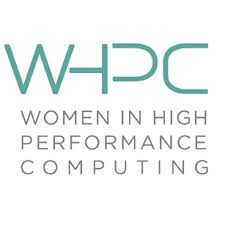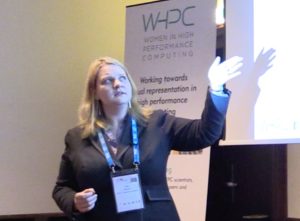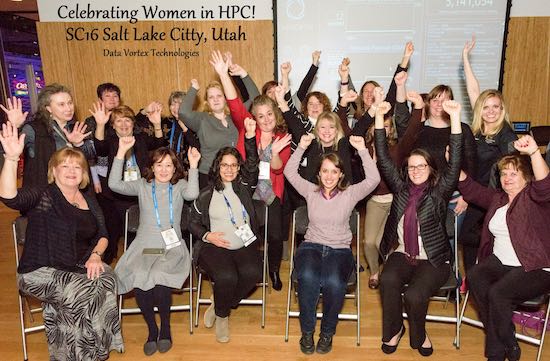In this special guest feature, Toni Collis from EPCC discusses her new role as SC17 Inclusivity Chair and a member of the Executive Committee.

Toni Collis is the SC17 Inclusivity Chair
SC17: What exactly does the term “inclusivity” mean?
Toni Collis: SC has always aimed to provide a rewarding conference experience for all attendees. Having a dedicated inclusivity committee take this a step further by looking at the conference experience for everyone no matter their background or way of life. We have a particular focus on improving the experience for those who have not previously felt included, especially those who may be in under-represented groups or minorities, but it is also about making the conference a positive experience where people do not feel marginalized for any reason. For SC, this also means understanding the demographics of those who attend, figuring out if we are missing key groups who do not attend as well as identifying barriers to participation.
SC17: Why is this initiative important to SC?
Toni Collis: SC believes, as do a majority of people these days, that who you are and your personal experiences should not be a barrier to participation. Sadly, we know that in the workplace your personal characteristics can be a barrier. As the leading HPC conference in the world, SC can lead the way in reducing any challenges to participation in the HPC community, thereby supporting the rapidly growing sector worldwide.
This is particularly important given the growing deficit between the requirements of the technology sector and the available workforce. The US Department of Labor has predicted a 19% increase in the computer science related workforce in the decade to 2024 . Europe expects a 756,000 IT sector job shortfall by 2020 , and Canada needs an additional 182,000 IT positions .
If our community excludes large portions of our potential workforce (including the 50% of women that make up the human population) because they do not feel included, we are only compounding the workforce shortfall.
We also know that diversity improves ‘team IQ’ and innovation . So improving a feeling of inclusivity throughout technology, and specifically in our community – HPC and Supercomputing – becomes an important facet of ensuring HPC delivers on its potential.
SC17: What are some of the objectives for this year?
Toni Collis: We have three main aims for 2017: first, to expand our reach and ‘inclusivity’ activities for groups that we have already identified as being under-represented in our community, such as women; second, to find out more about these and other groups; and third, to encourage this conversation to be had across the worldwide supercomputing community. We know that this conference alone can’t change the recruitment and retention of a diverse and inclusive HPC workforce, but we can contribute by sharing the information we find out, and encouraging others to count, analyze and address the situation in their own institutions.
SC17: What are the programs that will support these goals?
 Toni Collis: We will be continuing and expanding our childcare provision that was started during the SC16 conference. We are also continuing provision for those with children by providing a parents’ room (for men as well as women!) to provide an area of privacy and calm to take care of young ones. This year we have also developed a ‘child policy’ that provides clear guidance on where and when we can accommodate children within the conference. Safety of our attendees is paramount, including those that are less than 6 months old.
Toni Collis: We will be continuing and expanding our childcare provision that was started during the SC16 conference. We are also continuing provision for those with children by providing a parents’ room (for men as well as women!) to provide an area of privacy and calm to take care of young ones. This year we have also developed a ‘child policy’ that provides clear guidance on where and when we can accommodate children within the conference. Safety of our attendees is paramount, including those that are less than 6 months old.
Other activities include bringing back the Prayer and Meditation Room and also providing a conference center map to those with disabilities that clearly identifies areas that make the experience of navigating the halls easier.
Finally, we are also expanding our information sessions for first-time attendees. In 2016 we ran a ‘Navigating SC’ session (not just attended by first-timers!) that was so popular that in 2017 we will run two sessions and in a larger room. We welcome everyone to attend – there is so much going on during the SC week that it is often difficult to appreciate all the different aspects of the conference. We will also be providing information on the website aimed at those new to the conference to help them plan their week and understand what is available.
During the build-up to 2017,the inclusivity committee hopes to talk to those who do not feel ‘included’ in the conference to understand what we might be able to do to address their concerns. We know we can’t fix everything, and indeed something that works for one person may feel exclusionary to another, but done sensitively we hope to make SC a welcoming experience for everyone.
SC17: Why do you think women/minorities face challenges staying in the industry?
 Toni Collis: In any community where there are majority and minority groups, a minority will feel excluded. Some more excluded, some less so. The challenges are often complex and appear gradually over many years. Often exit interviews of those leaving technology sector jobs cannot identify one experience that makes a person leave their job or the sector, though a recent study of 4,000 women who had recently switched jobs found that the most cited reasons were “I was unsatisfied with the leadership of senior management” and “I was unsatisfied with the work environment/culture” .
Toni Collis: In any community where there are majority and minority groups, a minority will feel excluded. Some more excluded, some less so. The challenges are often complex and appear gradually over many years. Often exit interviews of those leaving technology sector jobs cannot identify one experience that makes a person leave their job or the sector, though a recent study of 4,000 women who had recently switched jobs found that the most cited reasons were “I was unsatisfied with the leadership of senior management” and “I was unsatisfied with the work environment/culture” .
Multiple studies find that women leave the tech industry because, for example, “they’re treated unfairly; underpaid, less likely to be fast-tracked than their male colleagues, and unable to advance”. Due to unconscious/implicit bias, women and minorities are more likely to be less appreciated, assigned less high-impact roles, receive lower pay and fewer promotions those who currently dominate our sector: white men. Relatively small, but continual and consistent actions add up over time, resulting in these groups feeling under-valued, not belonging and can result in under-represented groups therefore leaving their job, and sometimes the sector altogether.
SC17: What is your advice for a female or minority starting out in the industry?
Toni Collis: The number one piece of advice I give is to build your network. Speak up and reach out to role models (of both genders and all backgrounds, at all career stages and across academia and industry). Your network can help you build collaborations, generate ideas, and get your next job.
The great thing about attending SC is that because it is so large there are many inspirational people who are happy to talk to you. The other great thing about SC is realizing that you aren’t alone – while the proportion of an under-represented group may still be small, the size of the conference means you are more likely to meet someone like you. Personally, SC has built my network enormously over the five years that I have been attending.
SC17: Why is it important for organizations to publish their employee demographics?
Toni Collis: If we don’t understand our baseline level of participation, we don’t know if we really have a problem, or if HPC is unique, and also if the activities we put in place to improve diversity are having a positive (or indeed negative) impact.
Anecdotally, and from the little counting that has been done in HPC, including by SC, the situation is not great. Only 13% of attendees at SC16 were female. However, to understand how far we need to go, we need a much better understanding of the current situation. Is SC representative of the international HPC community, or is it better or worse?
I’m also a big believer in evaluating what we do. There are so many actions we could take, some which may be good, some which may be neutral and some which may actually negatively impact the groups we are trying to help, that we must understand where we start and how we progress. Counting the demographics in your organization doesn’t just help everyone else: it also helps you. If you can compare your organization’s demographics to others’, we can identify practices that work and those that don’t, helping to improve everyone’s workplaces for the better. Counting benefits us all.
SC17 takes place Nov. 12-17 in Denver Colorado.
Toni Collis is an applications consultant in HPC research and industry, providing consultancy and project management on a range of academic and commercial projects at EPCC, the University of Edinburgh Supercomputing Centre. Collis has worked at EPCC since 2011 after finishing a PhD in molecular simulation.
She is also a consultant for the Software Sustainability Institute and a member of the ARCHER team, providing ARCHER users with support and resources for using the UK national supercomputing service. In 2013, Toni co-founded Women in HPC as part of her work with ARCHER. Women in HPC has become an internationally recognized initiative, addressing the under-representation of women working in high performance computing and will have a presence at SC17.
Source: SC17 Blog



